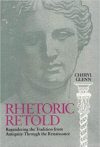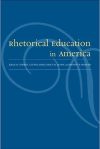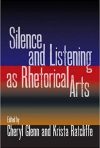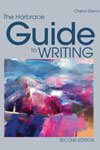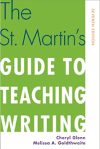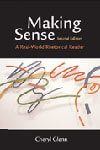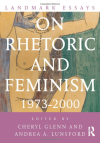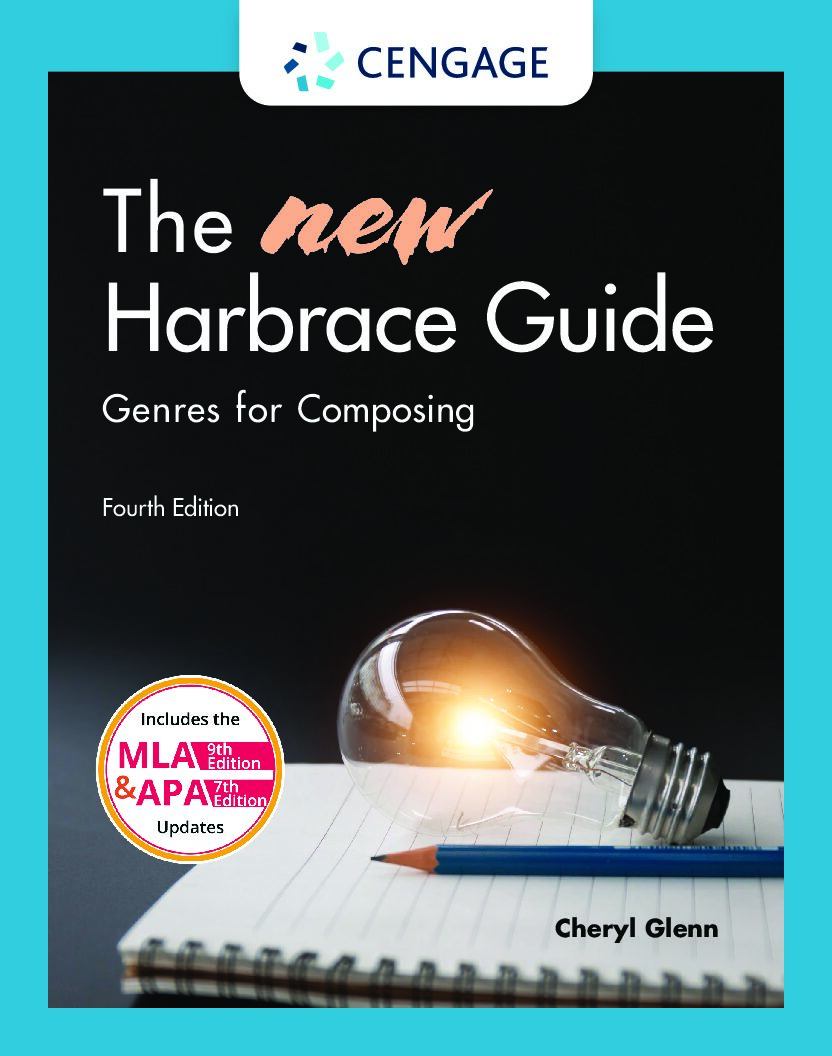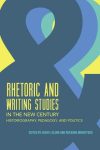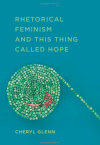Cheryl Glenn
Mailroom: 430 Burrowes Building

Education
Professional Bio
Cheryl Glenn is Distinguished Professor of English and Women's Studies (Emerita), former Director of the Program in Writing and Rhetoric, and co-founder of Penn State's Center for Democratic Deliberation. She has earned numerous research, scholarship, teaching, and mentoring awards and has delivered lectures and workshops across North America, Europe, Asia, the Middle East, and Africa. In 2015, she received an honorary doctorate from Orebro University in Sweden for her rhetorical scholarship and influence. In 2019, she received the Conference on College Composition and Communication (CCCC) Exemplar Award. And in 2024, she was elected as a Rhetoric Society of American (RSA) Fellow.
Professor Glenn's scholarly work focuses on histories of women's rhetorics and writing practices, feminist theories and practices, inclusionary rhetorical practices and theories, and contexts and processes for the teaching of writing. Her many scholarly publications include Rhetoric Retold: Regendering the Tradition from Antiquity Through the Renaissance; Unspoken: A Rhetoric of Silence; Rhetorical Feminism and This Thing Called Hope; Silence and Listening as Rhetorical Arts; Rhetorical Education in America; The St. Martin's Guide to Teaching Writing; The Writer's Harbrace Handbook; Making Sense: A Real-World Rhetorical Reader; The Harbrace Guide for College Writers; Harbrace Essentials; Landmark Essays on Rhetoric and Feminism, and numerous articles, chapters, and essays. She and Stephen Browne co-edit "Rhetoric and Democratic Deliberation," a Pennsylvania State University Press series. With Shirley Wilson Logan, she co-edits the Southern Illinois University Press series, "Studies in Rhetorics and Feminisms."
Glenn's rhetorical scholarship has earned her three fellowships from the National Endowment for the Humanities (NEH), book awards from Choice and from the Society for the Study of Early Modern Women, a Best Article of the Year Award from College Composition and Communication, an Outstanding Article Award from Rhetoric Review, and the 2009 Rhetorician of the Year Award. She also has won five university teaching and mentoring awards. She served as 2008 Chair of the CCCC, the largest professional organization of writing teachers in the world. She also serves in a variety of other leadership roles at Penn State and for the National Council of Teachers of English, the Coalition of Women Scholars in the History of Rhetoric and Composition, the Modern Language Association, the Rhetoric Society of America, and NEH. She sits on the editorial board of numerous scholarly journals.
National Dissertation Awards of Advisees
Ray Rosas (2023). “Black and Latinx College Writers Claim Writerly Agency: Negotiating Resources and Constraints in a Predominantly White Institution.” The chapter “Identifying Race-Evasive Textual Tactics in a Predominantly White Institution: Towards Antiracist Genre Resistance” was awarded the 2022 Council of Writing Program Administrators Graduate Student Writing Award, Honorable Mention.
Emily Smith (2021). “Performing Histories: Archival Embodiment as a Mode of Rhetorical Historiography.” Awarded the Presidents' Dissertation Award from the Coalition of Feminist Scholars in the History of Rhetoric and Composition. Assistant Professor, Breneau University.
Logan [Johnathan] Smilges (2020), "Queer Silences: Rhetorics of Resistance," winner of the 2020 Coalition of Feminist Scholars in the History of Rhetoric and Composition's Presidents' Dissertation Award. Assistant Professor, University of British Columbia.
Sarah Summers (2014), "Graduate Writing Centers: Programs, Practices, Possibilities," winner of the 2014 Council of Writing Program Administrators graduate-student writing award. Associate Dean of Academic Affairs, Franklin College.
Heather Brook Adams (2012), "On Secrets and Silences: Unwed Pregnancy Since the 1960s." Awarded the 2013 Conference on College Composition and Communication's 2013 James Berlin Dissertation Prize for the best dissertation in the field of rhetoric and composition. Candance Bernard and Robert Glickman Dean's Professor/Associate Professor, University of North Carolina Greensboro.
Rosalyn Collings Eves (2008), "Mapping a Rhetorical Frontier: Nineteenth-Century Women's Rhetorics in the American West." Rhetoric Society of America Best Dissertation Prize, 2009. Associate Professor, Southern Utah University.
Scott Wible (2006), “Three Decades of Language Policies in the United States: 1974 2004.” Winner of the 2014 CCCC Advancement of Knowledge Award for his Shaping Language Policy in the US: The Role of Composition Studies. Associate Professor, University of Maryland.
Jordynn Jack (2005), "Rhetorics of Time: Women's Role in Wartime Science, 1939-1945." One of two finalists for the American Society for the History of Rhetoric Best Dissertation Award. Awarded the Conference on College Composition and Communication's 2006 James Berlin Dissertation Prize for best dissertation in the field of rhetoric and composition. Professor of English at the University of North Carolina Chapel Hill.
Jessica Enoch (2003), "Contested Education: The Resistant Pedagogies of Lydia Child, Zitkala Sa, Jovita Idar, and Soledade Flores de Pena." Awarded one of ten Penn State University Alumni Association Dissertation Awards and the Conference on College Composition and Communication's 2004 James Berlin Dissertation Prize for best dissertation in the field of rhetoric and composition. ADVANCE Professor, University of Maryland.
Wendy Sharer (2001), "'That We May Raise the Standard of Thought and Speech': Rhetoric, Reform, and Political Activism in US Women's Organizations, 1910-1930." Awarded the Conference on College Composition and Communication's 2002 James Berlin Dissertation Prize for best dissertation in the field of rhetoric and composition. Distinguished Professor, East Carolina University.
Dissertation Committees, Major Advisor
Ray Rosas (2023), "Black and Latinx College Writers Claim Writerly Agency: Negotiating Resources and Constraints in a Predominantly White Institution." Assistant Professor Northern Arizona University.
Emily Smith (2021). “Performing Histories: Archival Embodiment as a Mode of Rhetorical Historiography.” Assistant Professor, Breneau University.
Shannon Stimpson (2020), "A History of Wartime College English in the United States, 1941-1945."
Layli Maria Miron (2020), "Reframing Immigration through Religious Advocacy: Rhetoric, Cosmopolitanism, and the Divine." Program Administrator for the Office of University Writing Programs, Auburn University.
Logan [Johnathon] Smilges (2019), "Queer Silence: Rhetorics of Resistance." Assistant Professor, University of British Columbia.
Greg Coles(2019), "Advantageous Incapacities: Reading the Margins with Kenneth Burke." Senior Research Fellow, The Center for Faith, Sexuality, and Gender. Boise, Idaho.
Laura Brown (2016), "Behind the Scenes: Women's Rhetorical Work in the African-American Freedom Struggle." Assistant Professor, Iowa State University.
Matthew Jackson Weiss Biddle (2015), co-directed with Stuart Selber, "Periodic Publishing and Rhetorical Time: The Birth and 'Death' of the Newspaper." Academic Advisor and Tutor Coordinator for TRIO, Student Support Services, University of Maine.
Sarah Summers (2014), "Graduate Writing Centers: Programs, Practices, Possibilities." Associate Dean of Academic Affairs, Franklin College.
John Belk (2014), "Rhetorical Verse: Poetry as Political Discourse in Twentieth-Century America." Associate Professor, Southern Utah University.
Heather Adams (2012), "Secrets and Silences: Rhetorics of Unwed Pregnancy since 1960." Candance Bernard and Robert Glickman Dean's Professor/Associate Professor, University of North Carolina Greensboro.
Brandy Scalise (2011), co-director with Jack Selzer. "Preaching without a Pulpit: Women's Rhetorical Contributions to Scientific Christianity in America, 1880-1915." Lecturer, University of Kentucky.
Rebecca Wilson Lundin (2010), "Language, Rhetorical Education, and the Development of National Identity in Sixteenth-Century England. Technical writer and Project Manager.
Michelle Smith (2010), "Materializing Spatial Rhetoric: Women's Rhetorics and Utopian Spaces in 19th Century America." Assistant Professor, Clemson University.
Stacey Sheriff (2009), "Beyond Rhetorical Failure." Director of Writing, Colby College.
Rosalyn Collings Eves (2008), "Mapping a Rhetorical Frontier: Nineteenth-Century Women's Rhetorics in the American West." Assistant Professor, Southern Utah University.
Scott Wible (2006), "Three Decades of Language Policies in the United States: 1974-2004." Associate Professor, University of Maryland.
Jordynn Jack (2005), "Rhetorics of Time: Women's Role in Wartime Science, 1939 1945." Professor, University of North Carolina Chapel Hill.
Jessica Enoch (2003), "Contested Education: The Resistant Pedagogies of Lydia Child, Zitkala Sa, Jovita Idar, and Soledade Flores de Pena." Associate Professor, University of Maryland.
Keith Gibson (2003), co-director with Jack Selzer. "Arguing Artificially: Understanding the Debates That Have Shaped Cognitive Science." Senior Design Consultant, Private Industry.
Wendy Sharer, (2001), "'That We May Raise the Standard of Thought and Speech': Rhetoric, Reform, and Political Activism in US Women's Organizations, 1910 1930." Distinguished Professor, East Carolina University.
Kakie Urch (ABD), Associate Professor, University of Kentucky.
Areas of Specialization
Rhetoric and Composition
Rhetorical histories, historiography, and theories (ancient to contemporary); composition theory and practice; rhetorical delivery systems (speaking, writing, silence, and listening); feminist and gender theories; feminist historiography, pedagogies, and research methods; medieval and Renaissance literatures
